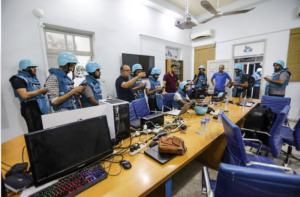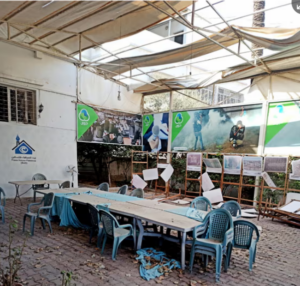‘An incredible loss for Palestine’: Israeli offensive takes deadly toll on journalists

Atef Abu Saif (fourth left) and Bilal Jadallah (third right) in the Press House office on 9 October 2023.
David Pegg, Hoda Osman and Manisha Ganguly report in The Guardian on 25 June 2024:
As Gaza City trembled to the sound of bombs, dozens of journalists made their way to a white-walled, two-storey building in the upmarket neighbourhood of Rimal.
It was the morning of 8 October 2023, and the building was the home of Press House, a Palestinian non-profit organisation training and supporting journalists.
Less than 24 hours earlier, Hekmat Yossuf, one of the group’s founders, phoned a colleague. “Get ready, we have to go to the office,” he said. Within hours they would put the word out to Gaza’s journalists that Press House was opening its supply of flak jackets – light-blue body armour and helmets, emblazoned with “PRESS” and a little cartoon logo of a house with the nib of a pen on its chimney.
Hatem Rawagh, 30, signed the flak jackets out one by one, just over 80 in total, checking the recipients knew how to put them on properly. Yossuf turned the office’s sole meeting room into a space for freelancers to file copy. Dozens of journalists crowded around a snarl of cables and laptops thrown together on the table.
In the centre of the activity was Bilal Jadallah. Tall and thin with a severe expression that masked a dry sense of humour, Press House’s founder had for 10 years nurtured his vision of a politically independent incubator for Palestinian journalism.
It had survived conflict before. In the back garden were 17 olive trees, planted in memory of reporters killed during an escalation in 2014. This time Jadallah felt it would get worse. “We are headed towards war,” he told Rawagh. “A major war.”

The courtyard of Press House in November 2023
Atef Abu Saif, 50, a Palestinian culture minister usually based in the West Bank, had been in Gaza on a short trip. When Hamas launched its assault, he turned up to Press House. He watched as Gaza’s journalists prepared to cover the war. “The only thing we can agree on is that we have no idea where this is going,” he wrote (Abu Saif declined to be interviewed, but provided journalists with a copy of his diary and permission to quote from it).
Eight months on from the 7 October attack, a reported 37,000 Palestinians have been killed in the Israeli offensive. Foreign media are banned by Israel and Egypt from entering Gaza to cover the war. Palestinian reporters such as those trained by Press House are the only journalists reporting from the ground.
This investigation draws on 15 interviews with current and former Press House board members, staff, financial or diplomatic backers, and widows or other surviving family members. Photo or video evidence of incidents circulating on social media were verified with witnesses. The Guardian worked with Arab Reporters for Investigative Journalists to tell this story, part of a collaboration coordinated by Forbidden Stories, a Paris-based non-profit.
The Committee to Protect Journalists, an American press freedom charity, describes the Israel-Gaza war as the deadliest period for media workers since it began collating its figures three decades ago. As of June it was tracking 108 killings, including two Israelis killed on 7 October.
